|
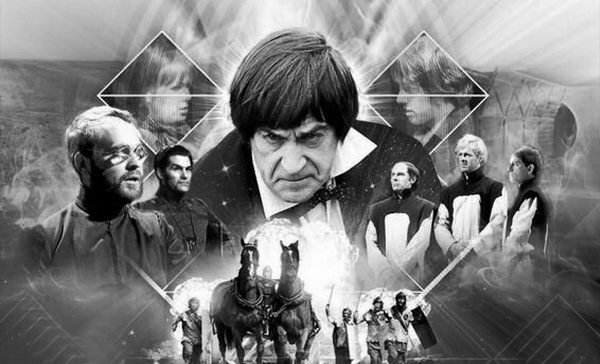
The War Games
19TH APRIL 1969 - 21ST JUNE
1969
(10 EPISODES)



The War Games
is one of those serials that will always be talked about. A
ten-part marathon that concludes not only Patrick Troughton’s reign as the
Doctor, but also the whole monochrome era of the programme, this
outstanding serial is also renowned for being the one that finally
revealed just where the mystifying man in the blue box came from.
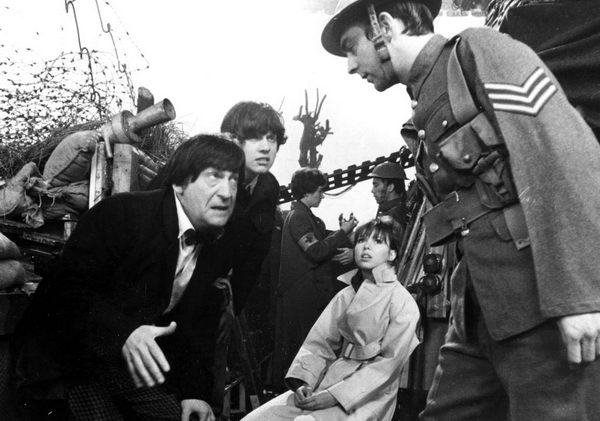
And it really has to be said, 2|entertain’s bountiful three disc DVD
release of it feels every bit as epic as the ten episodes themselves do.
With the first two discs each housing five episodes apiece (together with
an amusingly irreverent commentary featuring Frazer Hines, Wendy Padbury,
Terrance Dicks and Derrick Sherwin, amongst others), the third is
absolutely rammed with all manner of fascinating documentaries;
featurettes; and arbitrary ephemera, and it’s all easily-navigable thanks
to the range’s first (and long overdue) ‘Play All’ bonus material button.
Irrespective of the serial’s length, the presentation of this DVD is no
different than any other release in the range. Clayton Hickman’s stunning
artwork is present and correct, as is the customary collector’s booklet
(something that seems to becoming something of a rarity these days outside
Doctor Who. I had thought that the three discs might have warranted
a slightly larger, Lost in Time-style amaray case, but given how
swiftly my shelves are filling up these days, the standard-sized case is
more than welcome.
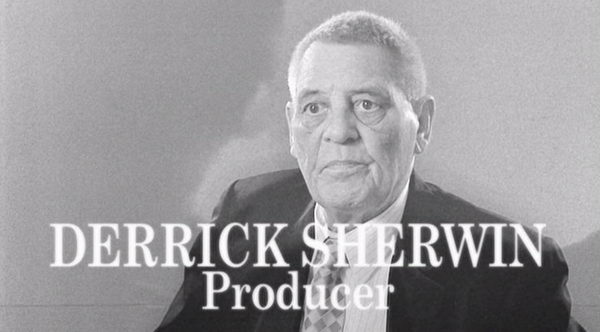
Above: “Terrance, we need a ten-part Doctor Who tomorrow.”
 The
most substantial of the special features is the thirty-six minute War
Zone: The End of an Era, which focuses primarily on the making of
The War Games and the dying days of the Troughton era. Those that were
on hand for the commentary each contribute numerous anecdotes (albeit in a
slightly more refined manner) and we are also treated to the insights of
those such as Doctor Who Magazine editor Tom Spilsbury and writers
Paul Cornell, James Moran and Joseph Lidster. Late director David Maloney
also contributes to the feature posthumously, very interestingly revealing
his young son’s hand in selecting the wars to be featured in the serial. The
most substantial of the special features is the thirty-six minute War
Zone: The End of an Era, which focuses primarily on the making of
The War Games and the dying days of the Troughton era. Those that were
on hand for the commentary each contribute numerous anecdotes (albeit in a
slightly more refined manner) and we are also treated to the insights of
those such as Doctor Who Magazine editor Tom Spilsbury and writers
Paul Cornell, James Moran and Joseph Lidster. Late director David Maloney
also contributes to the feature posthumously, very interestingly revealing
his young son’s hand in selecting the wars to be featured in the serial.
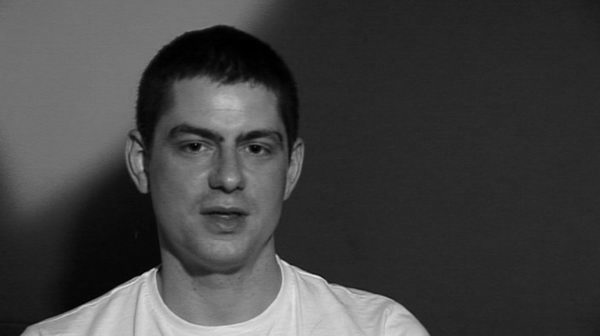
Above: Joseph Lidster Talking About Regeneration
However, the highlight of the bonus material is, ironically, little to do
with The War Games. Doing exactly what it says on the tin,
Talking About Regeneration sees many of the writers and actors that I
have already mentioned (to the sound of The Who’s “My Generation”) talking
about what a wonderful concept regeneration is and, inevitably, commenting
on the seven that we’ve seen on screen to date. Dalek writer Rob
Shearman has some very interesting insight to offer, in particular
concerning the original plans for The Celestial Toymaker which I’d
not heard of before; Gareth Roberts offers some typically wry observations
on the “tumultuous buffeting” that Pip and Jane Baker would have us
believe did for sixth Doctor; whilst Clayton Hickman amusingly condemns
the segue from Jon Pertwee to Tom Baker as “rubbish”. On a more serious
note, I was pleased to discover that many of these writers that I hold in
such esteem share my views on both Logopolis and The Caves of
Androzani, as well as the wisdom of not kicking off Rose (and
Time and the Rani, for that matter) with a regeneration. I say
many, as opposed to all, as for some reason Hickman has elected to
champion Time and the Rani, fake regeneration and all.
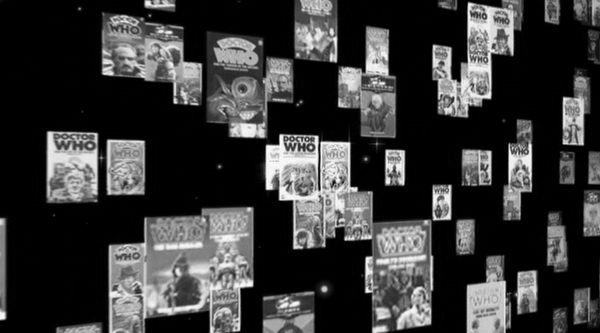
Above: On Target
Not far behind though is the first in a series of features focusing on the
authors of the all-pervadingly popular Target novelisations that so many
of us were raised on. Clocking in at twenty minutes dead, On Target -
Malcolm Hulke examines the output of The War Games’ co-writer,
who somehow managed to cram the ten-part blockbuster into just 143 pages
of simmering prose for Target just prior to his death in 1979. Second only
to Dicks in the eyes of many, it’s wonderful to see the likes of Gary
Russell give Hulke his due in this magnificent tribute. No expense is
spared either, as Katy Manning and Peter Miles are brought in to read
excerpts from Doctor Who and the Cave Monsters and Doctor Who
and the Dinosaur Invasion respectively. I’m looking forward to the
next On Target - I wonder if they’ll put a whole disc aside for
Dicks?

Above: Former Big Finish
supremo Gary Russell in the On Target featurette
Meanwhile, Stripped for Action continues a similar series of
features, this one focusing on the Doctor’s diverse array of comic strip
adventures over the years. Naturally this fourteen-minute instalment
focuses on the second Doctor’s adventures in TV Comic which, laden
as they were with chatty Quarks and Tenth Planet-style Cybermen on
skis, seem to have marked a downright bizarre period for the strips.
Nevertheless, the post-exile stories look interesting (particularly the
one that sees a bunch of scarecrows “complete” the Doctor’s sentence) ,
and I think it’s quite telling that Jamie was the first television
companion to be used in the medium.
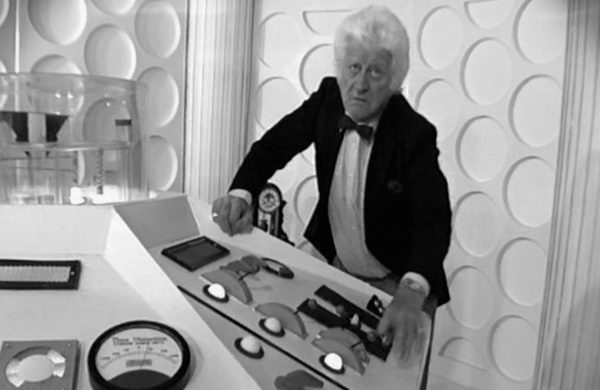
Above: Jon Pertwee stars in
the legendary fan production, Devious
I think that the special feature that has piqued the most interest though
generally has been the inclusion of Devious, the legendary
non-profit fan production that has been running for well over a decade
now. Set as it is in that cloudy period between The War Games and
Spearhead from Space, Devious sees the second Doctor morph
into interim incarnation Tony Garner who – from the explosive
trailer-style montage included in the middle of this short feature -
enjoyed a wide range of adventures before Jon Pertwee showed up to take
his crown back. It’s lovely to see Pertwee back in the role for that one
last time, especially so as he ends up decked out in the Troughton outfit
and stumbling out of the TARDIS into those woods.
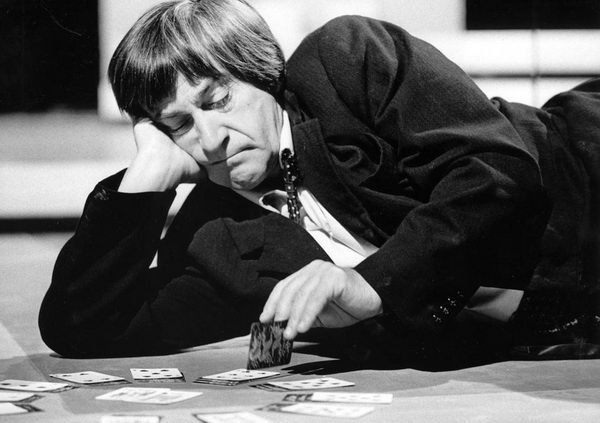
And the bonus material doesn’t end there. Shades of Grey looks at
the “the technical and artistic constraints of monochrome television” and
how it influenced the style of programmes made in it. Whilst this is
certainly an interesting area to explore, the feature is a little too wide
in its scope for my tastes - only about five of the featurette’s twenty
minutes are expressly Doctor Who-related. Similarly, the
fifteen-minute Time Zones has little to do with Doctor Who,
focusing instead on the reality behind each of the different time zones
featured in The War Games. The bonus disc is then rounded off with
a ten-minute Now and Then, which takes us back to the site of
Shepcote Valley’s rubbish dump (to which time appears to have been kind);
a chat of similar length with make-up designer Sylvia James; and a
near-enough twenty-minute précis of composer Dudley Simpson’s first five
years’ worth of work on the series.

.jpg) Turning
to the serial itself, whilst it’s generally acknowledged that The War
Games is far too long and padded to the hilt, it nonetheless remains a
bona fide classic in every respect, not to mention the most
visually outstanding Doctor Who serial ever to be shot in
monochrome. My initial encounter with Troughton’s swansong was via Hulke’s
novelisation (right), which I instantly fell in love with, despite
frets over how ten twenty-five minute episodes could’ve been condensed
into so few words without losing something of the substance. Years later,
I finally got to watch all ten episodes of the serial on UK Gold and I
realised that there isn’t all that much substance; The War Games
is, for the most part, a circular dance - escape, capture, escape,
capture, escape… Turning
to the serial itself, whilst it’s generally acknowledged that The War
Games is far too long and padded to the hilt, it nonetheless remains a
bona fide classic in every respect, not to mention the most
visually outstanding Doctor Who serial ever to be shot in
monochrome. My initial encounter with Troughton’s swansong was via Hulke’s
novelisation (right), which I instantly fell in love with, despite
frets over how ten twenty-five minute episodes could’ve been condensed
into so few words without losing something of the substance. Years later,
I finally got to watch all ten episodes of the serial on UK Gold and I
realised that there isn’t all that much substance; The War Games
is, for the most part, a circular dance - escape, capture, escape,
capture, escape…
Indeed, Hulke and Dicks’ multi-layered plot is peeled away very slowly,
one layer at a time. A viewer could be forgiven for thinking that Major
Smythe is the real villain of the piece from watching the first few
episodes, as the War Lord himself does not even show up until half way
through the serial, and even then his introduction is pre-empted by that
of the War Chief. Further, much of the plot (all of the ‘resistance’
stuff, for example) could have quite losslessly been cut away to make this
story a relatively fast-paced five or six-parter.
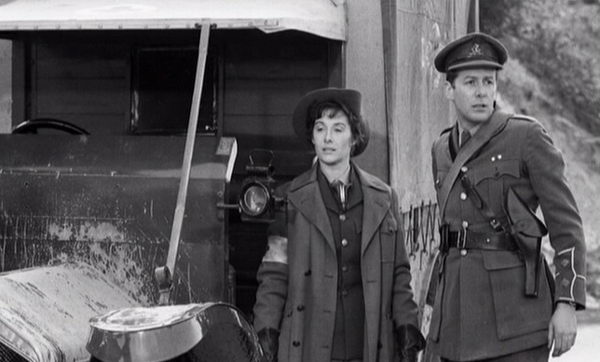
.jpg) Nevertheless, The War Games remains to this day a real favourite of
mine. In one way, its extraordinary length works to its advantage as it
completely sucks the viewer into the story and its characters, in a sense
making it more like a novel than a television show - quite ironic, given
that the experience of watching this serial is more like reading a novel
than reading the novelisation of it is. And though I certainly wouldn’t
recommend to anyone sitting themselves down and watching all four hours of
The War Games in one sitting, viewing it in either in two halves (as I
tend to do, and as the layout of the DVD release encourages), or even
episodically, is something that every Doctor Who fan should do at
least once. Nevertheless, The War Games remains to this day a real favourite of
mine. In one way, its extraordinary length works to its advantage as it
completely sucks the viewer into the story and its characters, in a sense
making it more like a novel than a television show - quite ironic, given
that the experience of watching this serial is more like reading a novel
than reading the novelisation of it is. And though I certainly wouldn’t
recommend to anyone sitting themselves down and watching all four hours of
The War Games in one sitting, viewing it in either in two halves (as I
tend to do, and as the layout of the DVD release encourages), or even
episodically, is something that every Doctor Who fan should do at
least once.
The War Lord’s plan is suitably fantastic fodder for a great Who
adventure - take an alien planet, split it into different war zones,
gather soldiers from different times in Earth’s history, brainwash them,
and then let them kill each other until all you have left is an invincible
army of hardened veterans that you can conquer the galaxy with. Fair dues,
as Paul Cornell points out in the War Zone documentary, a
“Champions’ League” of human soldiers is a little bit of a roundabout way
of raising a galactic army, but if you don’t scrutinise this aspect of the
plot too vigorously, the wonderful premise really opens the doors to some
peerless storytelling. Hulke and Dicks’ premise provides so many wonderful
opportunities for storytelling and in ten episodes they exploit them all.
Just look at the ‘Doctor up against a firing squad’ cliffhanger; or his
strutting into a military prison, shouting his mouth off in outrage about
how the person in charge there isn’t giving him enough respect, and
subsequently being accepted by this person as an authority figure on the
strength of his bluster alone. Even the story’s opening is breathtaking -
what could better the TARDIS materialising in the middle of No Man’s Land
on a Great War battlefield in France?
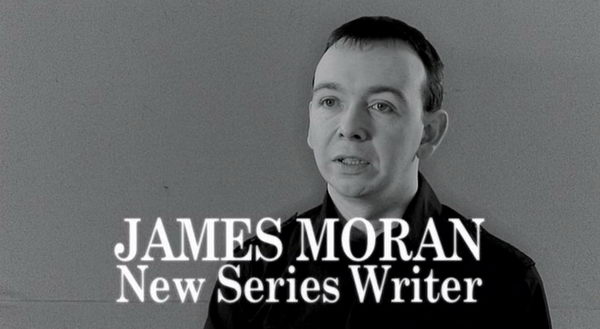
Above: James Moran in the War
Zone: The End of an Era documentary
Best of all though, the story’s subtext presents a powerful anti-war
message; a message so powerful, in fact, that Joseph Lidster describes
The War Games as the “most anti-war story” that he’s ever seen. For me
though, The Fires of Pompeii writer James Moran sums the sentiment
up most memorably when he says that of all the races of the cosmos, these
beings found humans to be the most warlike; we have more wars than even
the Daleks.
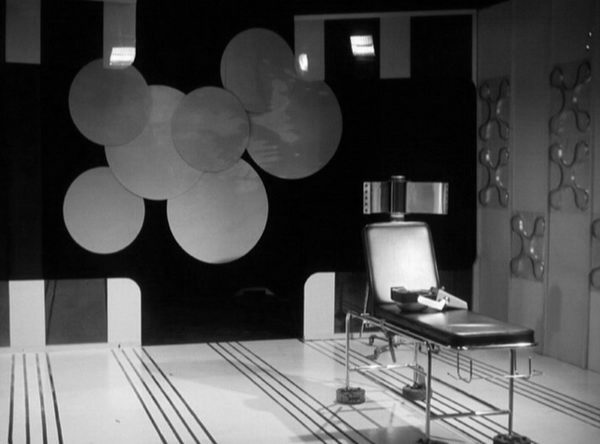
.jpg) In terms of production value, due to its predominantly ‘historic’ setting
the standard seems quite a lot higher than that of contemporaneous
stories. The sets of the trenches and the chateau are beautifully created;
were it not for them being shot in monochrome there would be nothing to
distinguish them from programmes like Blackadder Goes Forth, made
almost twenty years later. But the superb design of The War Games
is not limited to the various historical time zones. The imaginative sets
are filled with glass maps and guillotine doors, and never before have I
seen a set that cries out 1960s as much as the War Lord’s groovy domain
does. Phrases like ‘pop art’ and ‘psychedelic’ don’t even begin to
describe it - if you’ve ever seen any of the Austin Powers movies,
you can just imagine the setting. It makes a fantastic change from the
grey corridors and flashing lights that Doctor Who so often used to
depict ‘futuristic’ settings, and with this DVD release we are finally
able to see some shots of it in full, gaudy colour. In terms of production value, due to its predominantly ‘historic’ setting
the standard seems quite a lot higher than that of contemporaneous
stories. The sets of the trenches and the chateau are beautifully created;
were it not for them being shot in monochrome there would be nothing to
distinguish them from programmes like Blackadder Goes Forth, made
almost twenty years later. But the superb design of The War Games
is not limited to the various historical time zones. The imaginative sets
are filled with glass maps and guillotine doors, and never before have I
seen a set that cries out 1960s as much as the War Lord’s groovy domain
does. Phrases like ‘pop art’ and ‘psychedelic’ don’t even begin to
describe it - if you’ve ever seen any of the Austin Powers movies,
you can just imagine the setting. It makes a fantastic change from the
grey corridors and flashing lights that Doctor Who so often used to
depict ‘futuristic’ settings, and with this DVD release we are finally
able to see some shots of it in full, gaudy colour.
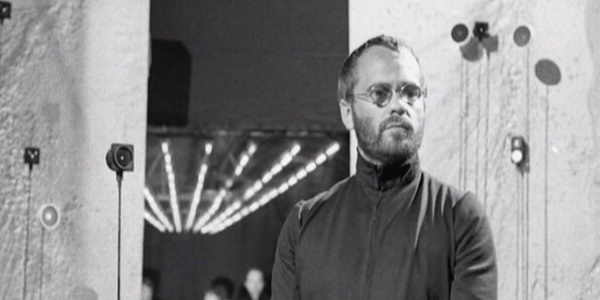
One of the major reasons that The War Games is so compelling though
is the brilliance of its characters. Carstairs (David Savile) and Lady
Jennifer (Jane Sherwin) are likeable enough to have become successful
companions were the circumstances different, and the more nefarious
characters like the intimidating General Smythe and the deplorable
Security Chief are both interesting enough to have supported their own
(shorter) serials. The War Lord himself is wonderfully brought to life by
Doctor Who veteran Philip Madoc, whose calm performance imbues the
character with a real sense of power – he doesn’t need to throw his weight
around too much; he’s already as feared and respected as he possibly could
be.
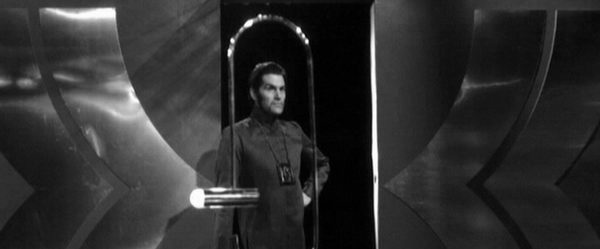
“Time travellers. I wonder…”
The operatically villainous War Chief, however, is the most interesting
character by far. Episode 8 sees the series’ first mention of the Time
Lords as, like the Doctor, the War Chief is revealed to be a renegade Time
Lord on the run from his people. He wants the Doctor to help him overthrow
the War Lord so that they can rule the galaxy together. I found myself
quite amused by the War Chief’s dialogue when he speaks to the Doctor;
it’s uncannily similar to Darth Vader’s in The Empire Strikes Back,
a film which was still over a decade away when The War Games was
written. And, just like all good villains, the War Chief completely
believes that his wacky scheme for galactic domination is right and just.
The Doctor, however, is far from convinced, and for the first time since
leaving his home world, he finds himself in a situation that he cannot
resolve - at least, not without help.
Enter the Time Lords.
Episode 9 of The War Games ends with the ultimate deus ex
machina. Answering the Doctor’s telepathic message in a box, producer
Derrick Sherwin’s Time Lords’ wave their magic wand and the games’
combatants are each returned to their customary times and places; the War
Lord is in their custody; and the War Chief is dead, apparently killed by
his former associates.
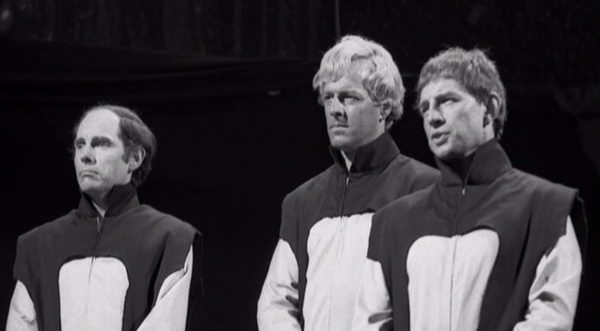
“You have returned to us, Doctor. Your travels are over.”
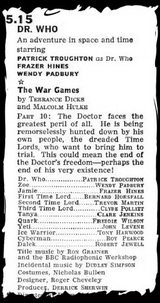 Episode
10 is practically a different story altogether, and arguably contains the
biggest reveal in the history of the series. The Doctor’s people are
introduced to us as a nearly omnipotent race that have not merely gained
mastery over time and space, but also appear to have god-like powers
(which one of them uses to physically punish the War Lord when he refuses
to testify in his trial). Although they have a policy of strict
non-intervention, the Doctor’s summons forces them to try the War Lord for
his crimes and eventually sentence him to temporal dissolution – he’s not
just executed, he’s wiped from history. However, their strict policy of
non-intervention is one that the Doctor has constantly flouted, and
there’s also his “borrowing” of a TARDIS to consider. Like the War Lord
before him, the Doctor is summarily tried for his crimes and found guilty.
However, the Time Lords take account of the Doctor’s good intentions and
his role in the battle against evil, and therefore decide to punish him by
exiling him to 20th century Earth and forcing him to regenerate,
effectively executing his second incarnation. Episode
10 is practically a different story altogether, and arguably contains the
biggest reveal in the history of the series. The Doctor’s people are
introduced to us as a nearly omnipotent race that have not merely gained
mastery over time and space, but also appear to have god-like powers
(which one of them uses to physically punish the War Lord when he refuses
to testify in his trial). Although they have a policy of strict
non-intervention, the Doctor’s summons forces them to try the War Lord for
his crimes and eventually sentence him to temporal dissolution – he’s not
just executed, he’s wiped from history. However, their strict policy of
non-intervention is one that the Doctor has constantly flouted, and
there’s also his “borrowing” of a TARDIS to consider. Like the War Lord
before him, the Doctor is summarily tried for his crimes and found guilty.
However, the Time Lords take account of the Doctor’s good intentions and
his role in the battle against evil, and therefore decide to punish him by
exiling him to 20th century Earth and forcing him to regenerate,
effectively executing his second incarnation.
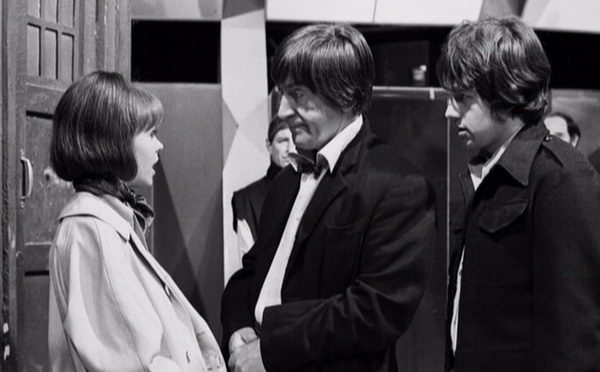
The Doctor’s goodbye to Jamie and Zoe is a real choker, and the blow is
made all the more cruel by the Time Lords’ erasing of their memories of
their travels with the Doctor. This is sad enough in Jamie’s case, but in
Zoe’s it’s absolutely tragic. After how much her travels with the Doctor
have changed her for the better as a person, the Time Lords wipe her
memory of everything but The Wheel in Space. Padbury is absolutely
superb in the coda on the Wheel; shrugging off a slight feeling that she
has forgotten something, she returns to her duties. Back to “all brain and
no heart” for her.
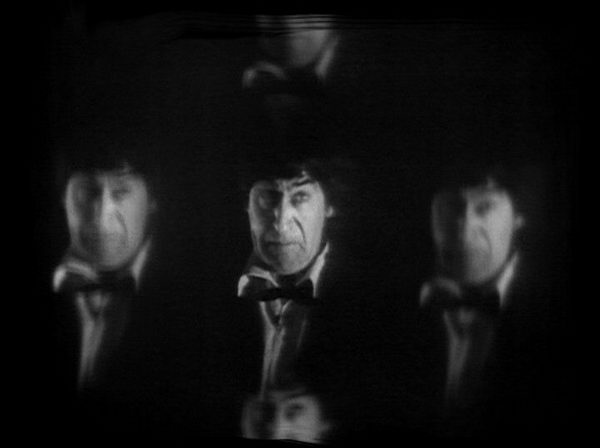
And so the Troughton era ends on television with the Doctor’s face
contorting as he disappears into the aether. Despite its prolonged length,
The War Games is a real tour de force, and the DVD release
is perhaps the most comprehensive that we’ve seen since The Trial of a
Time Lord last year. And, for the little extra that it costs, the
value for money here is unparalleled; particularly when compared with a
release such as Image of the Fendahl, which retailed online for
just 49p less than The War Games despite being six episodes and a
bucket load of special features lighter. So do yourself a favour and bump
this one up to the top of your wish list – even if you aren’t convinced by
the many endorsements above, it’s worth it simply to check out some of the
imaginative facial hair on show.
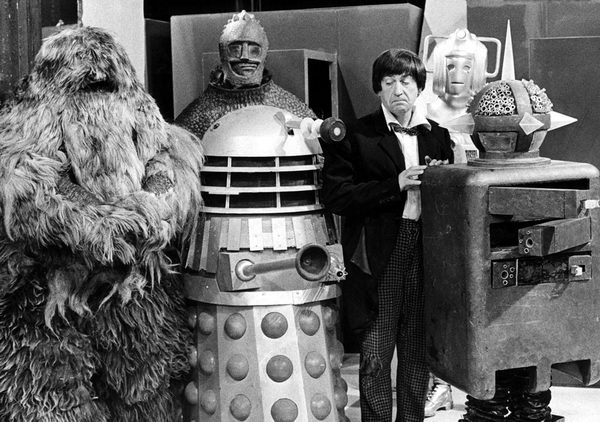
|